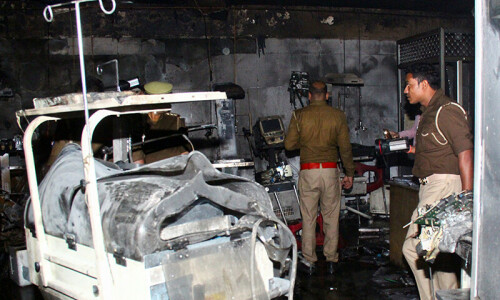I AM guilty of writing an honest article (‘I am corrupt honestly’, Jan 20), on the lowly-paid civil servants of Pakistan. Since then I have come across something on the notion regularly. I am not justifying corruption; it’s the Government of Pakistan that is doing it. I am a beginner in the arena of civil service; and you also read the views of Syed Anwar Mahmood, a former federal secretary, in ‘Saving the steel frame’ (Feb 8). In almost all the letters to the editor showing disagreement with the fact that salaries of civil servants are laughably low, the greatest argument presented was the nuisance value civil servants enjoy.
If you want civil servants to behave like the sahib bahadur then continue to pay them peanuts and they will pay back with the same attitudes that the common man in Pakistan seems to have become used to.
An engineer working in a telecom company or a professor delivering lectures does not take decisions as important as a civil servant does. He has no impact on poverty alleviation in the country, he doesn’t face the ruthless press when a bomb goes off somewhere, he cannot reduce corruption in land-transfer deeds and cannot take a stand against merit being overruled to dole out jobs on some politician’s recommendation. He draws his salary, goes home and sleeps tight.
For those who think that CSPs embark on this career by choice and can leave if they are unhappy, my case was in favour of retaining the human resource worth much more than the few thousand rupees that the government is reluctant to invest in to save the steel frame.
No wonder the state machinery is near implosion. The trend among civil servants leaving the service to join the private sector has seen a definite increase. The end result is that these individuals gain financially and the government loses exponentially because it is the human resource that matters most in the destiny of a country.
The 2010 Corruption Perceptions Index by Transparency International ranks Singapore at number one and Pakistan at 143 among the least corrupt countries of the world. Interestingly, Singaporean bureaucrats are the most highly paid in the world and Pakistani bureaucrats the exact opposite.
Quoting directly from Dynamic Governance: Embedding Culture, Capabilities and Change in Singapore by Neo Boon Siong and Geraldine Chen (2007), public-sector compensation rests on five core principles in the Singapore Civil Service:
“(i) Paying competitive rates commensurate with market rates: annual salary reviews are carried out with comparisons based on equivalent job markets or equivalent qualifications.
“(ii) Paying flexible wage packages: the flexible component of up to 40 per cent of annual compensation enables the public sector to reward staff according to performance of the general economy and of the individual.
“(iii) Performance -driven pay: the performance bonus system, extended to all officers in 2000, makes a strong link between pay and ability and enables the system to differentiate between outstanding, average and underperforming staff, reinforcing the meritocratic ethos.
“(iv) Recognising potential: good officers are eligible for merit increments. High-performing, high-potential officers receive much higher increments, helping them to ascend the career ladder at a much faster rate.
“(v) Paying clean wages: public-sector salary packages translate as many benefits as possible into cash. This reduces the number of hidden perks and increases transparency and accountability.”
It is absolutely necessary to motivate the young blood entering the civil service by revising perks and privileges because hardly anybody joins the service with the intention of corruption. But factors like low wages contribute to the first step in this direction.
A wise man once said that being corrupt is like descending a mountain; you take the first step and later steps follow. I feel like I am on top of a mountain and when I get my payslip I have a huge urge to get to the base. Since I am a mere mortal I can’t resist for too long.
Lastly, with cricket fever on the increase, I would like to say that it is very easy to play cricket when sitting on the sofa of your living room and watching the match on TV. Things get a lot tougher when you actually step into the arena.
The writer is a civil servant. s_a_h_2@hotmail.com









































Dear visitor, the comments section is undergoing an overhaul and will return soon.